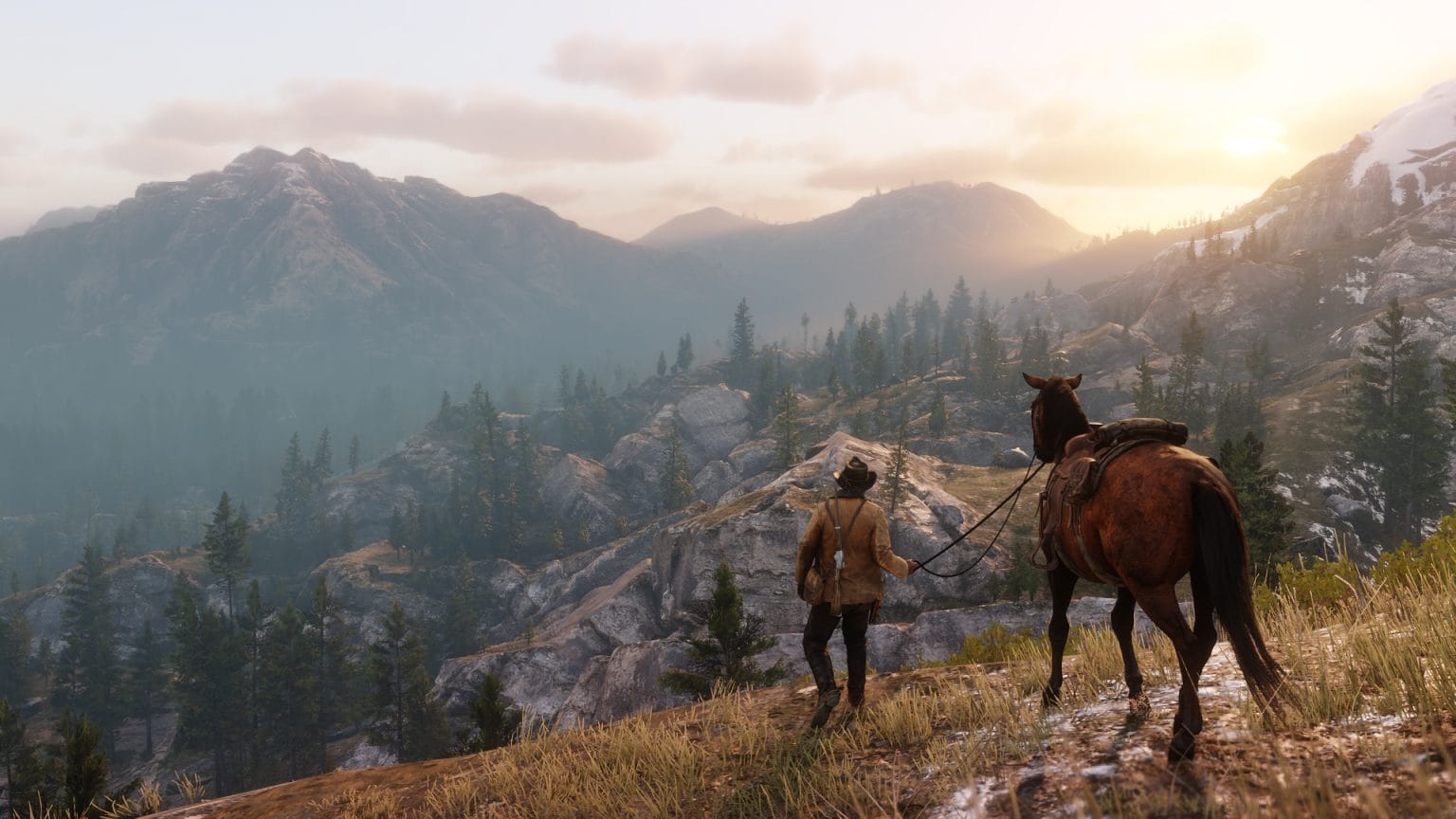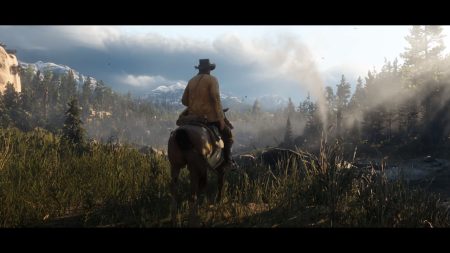Disclaimer: This game is super long and I have so many thoughts about it, and there’s just no way one article can encompass all of those thoughts.
Red Dead Redemption 2 might very well be the most fascinating game I’ve played in years. It doesn’t intrigue me in the way stranger titles like No Man’s Sky or Gone Home do, but I find myself constantly thinking about it, believing it to be simultaneously a brilliant masterpiece and a frustrating mess.
I’ve written before about my anxiety around how I feel about L.A. Noire (another Rockstar-published title), since it does so many things well and so many things poorly. But RDR2 is clearly a more refined and self-assured piece of art than L.A. Noire, which makes its shortcomings all the more noticeable, though not quite as damning. A game as large as Red Dead 2 lends itself to a litany of excellent moments as well as puzzling failures. Its story is complex and moving, but also far too long and full of problematic omissions. The controls are wonky as hell, but some of that wonkiness leads to some incredibly immersive sequences. The world is beautiful and massive, but it’s so big that it’s impossible to play through the game without feeling like you’re missing something. For every great aspect of Red Dead Redemption 2, it’s easy to find something worthy of derision.
While Red Dead Redemption 2 is an overall phenomenal experience, its flaws are just glaring enough to poke holes in any argument proclaiming the game to be the next truly great work of video game art. Some of my gripes amount to minor issues or personal preferences (I don’t really care for hunting and crafting in games), but in other ways RDR2 ends up embracing some of the worst video game trends of the modern era, even though its most successful parts represent the best the industry can offer.
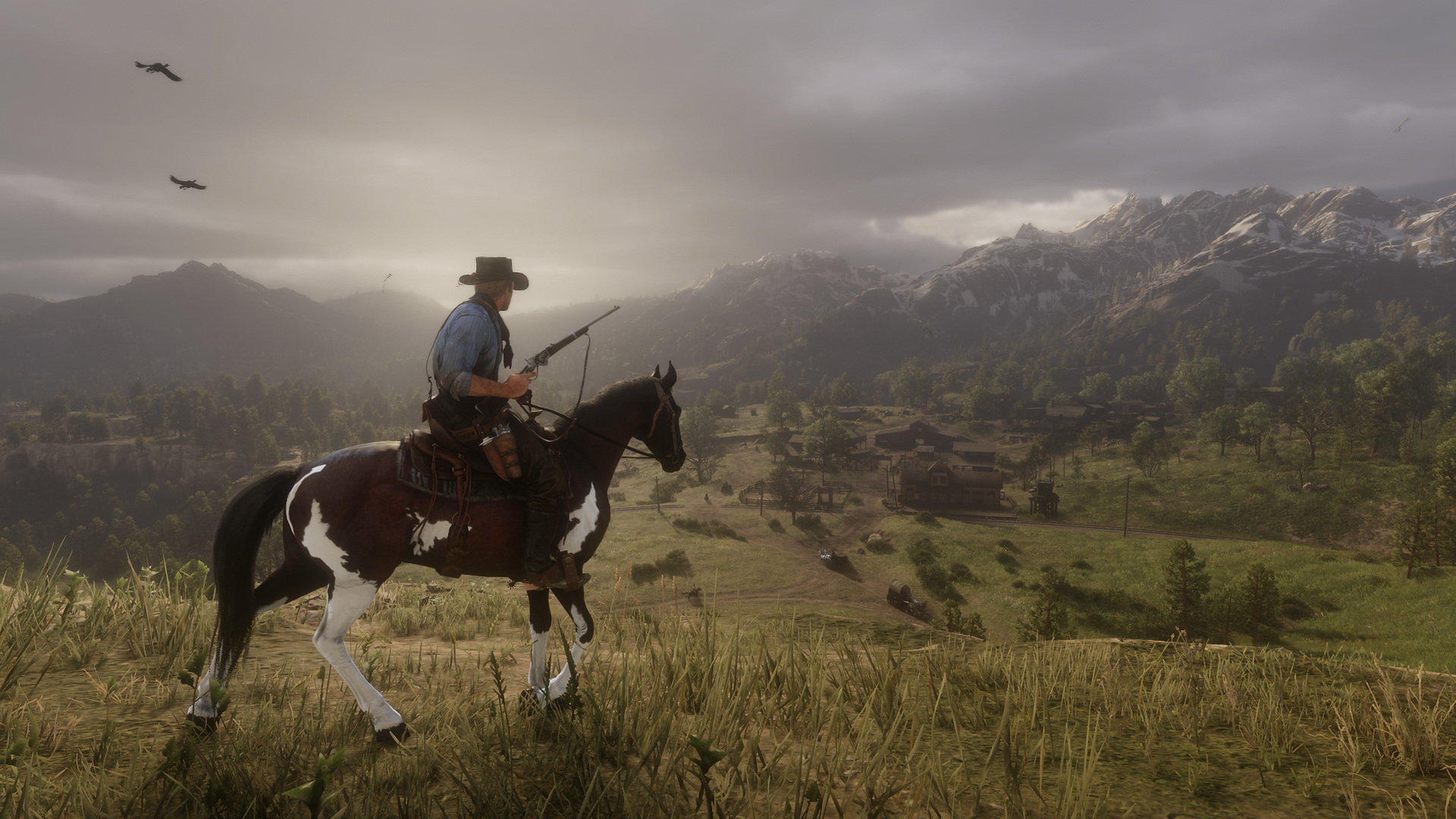
The Devil is in the Details
The biggest selling point of Rockstar’s latest cowboy thrill-ride is the incredible attention to detail. Reviewers have highlighted the game’s various bells and whistles, from gun-cleaning animations to the ever-changing size of a horse’s testicles.
When these details work, they make RDR2 a uniquely immersive experience. Some of the seemingly simplest mechanics combine for some truly great moments, such as pouring yourself a cup of coffee (press RT on Xbox One to drink), walking over to sit on a log (hold Y to sit), and then chatting with a fellow cowboy (press X to greet). A few button presses and PRESTO! You’re having a basic yet meaningful interaction with someone that doesn’t involve embarking on a quest. In other cases, the mere act of polishing your weapons with gun oil or browsing a handwritten catalog for new clothes makes the world feel real, as the slowness of each action brings the player down to earth for a moment. Games typically give the player license to shatter the barriers of reality in favor of a smoother gameplay experience, while Red Dead Redemption 2 asks the player to truly live within the constraints of its pseudo-realistic universe, even if that means you have to watch a gruesome and discomforting animation anytime you skin a deer.
Many of these slow and deliberate actions almost feel magical because of how mundane they are, not in spite of it. Games like Skyrim allow you to pick up and store items instantly with the press of a button, while RDR2 demands that you watch Arthur Morgan pick up an object and briefly examine it before physically storing it in his bag. These moments may feel awkward and glacial at first, but they may very well represent the future of open world games, where the player’s relationship with the world around them is more similar to real life than ever.
Other such details, however, are awkward and often totally unnecessary. If you don’t properly hitch your horse before you get off, it might wander around the streets and annoy pedestrians. This would normally be fine, except if you aren’t at just the right angle near a hitching post, you can’t perform this action. Moments like these happen constantly, where the player is either marginally too close or too far away to interact with something, and Rockstar’s annoying penchant for making walking and running extremely difficult to properly pace only exacerbates this issue. It reminds me of how basic cord strumming in Guitar Hero was often more challenging than playing solos; the actions that are easiest to perform in real life become frustratingly difficult when replicated virtually.
Despite their best efforts, some of these new systems don’t actually make the game better. If you don’t eat often enough, your character gets skinny, though there doesn’t really appear to be particularly harsh consequences for such negligence. If you want, you can chop wood at the gang’s campsite, but you’re never asked to do that, and it doesn’t seem like anyone cares if you never hack at a single log. The hunting mechanics are greatly improved from previous Rockstar games, but it’s not like these hunting challenges amount to much more than filler.
It’s impossible to separate recent reports about absolutely ghastly working conditions at Rockstar from my experience with all these little things. Every time I accidentally run into an NPC because I stopped pressing the A button a nanosecond too late, I think about how somebody from QA wasn’t allowed to eat hot food at their desk. Whenever the game tells me I can slowly craft some clever bait to attract a bear, I get the feeling that somebody’s marriage was compromised to include that feature, which I never use. Even when I’m blown away by how cool some of these little nuances are, I’m reminded that they came at the expense of the well-being of hundreds of workers.
It’s great that Rockstar chose to take risks with these new mechanics, and I often encourage developers to think differently about basic systems. When they work, they work wonderfully. When they don’t, they make me ponder whether this kind of future is what I want for gaming as a medium. One thing’s for sure: none of these details are worth it if people have to suffer to create it.
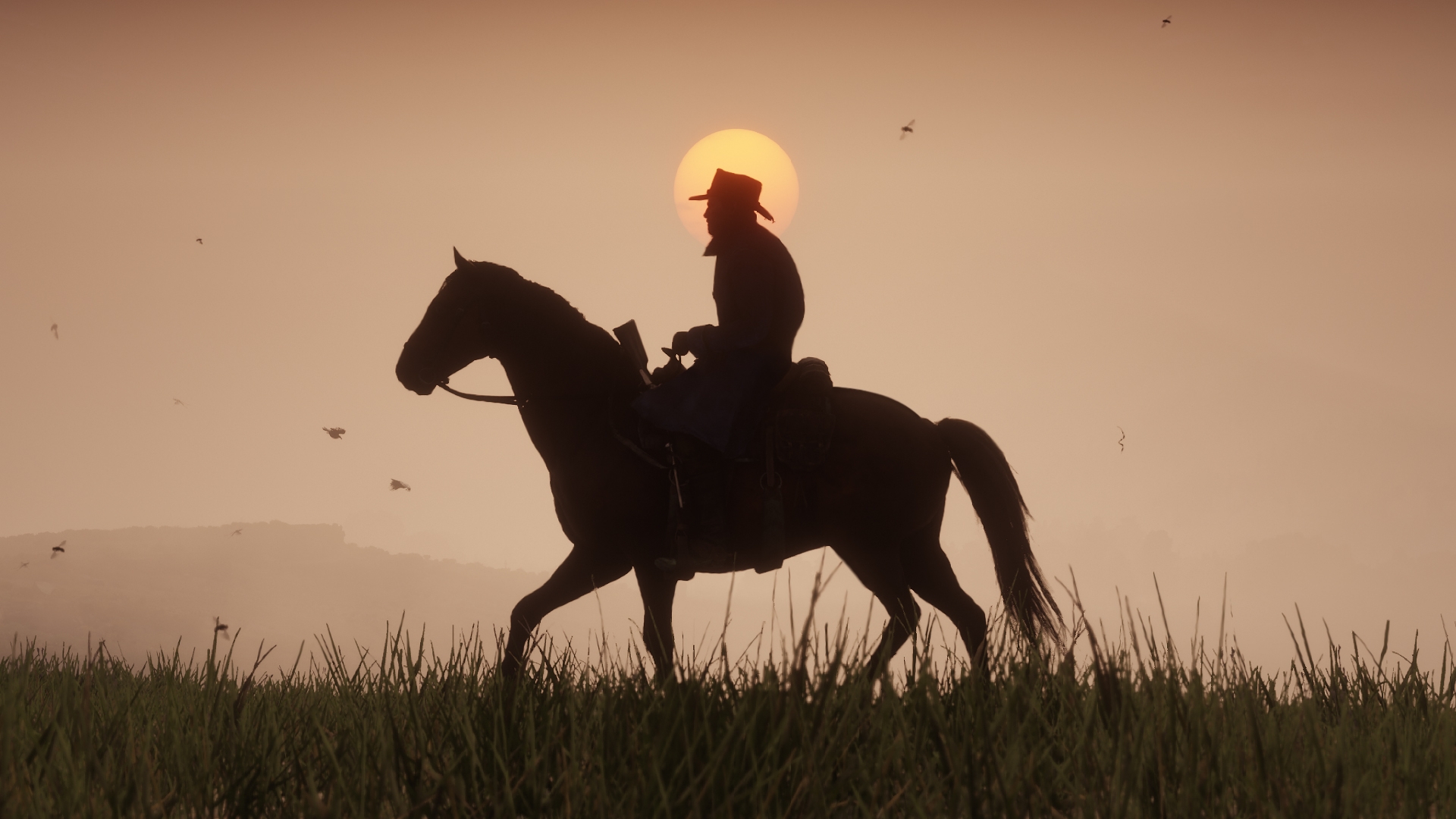
Goin’ West
I mentioned in my most recent Punished Notes that Red Dead Redemption 2 feels a lot more like the first Red Dead Redemption than I had expected. This is largely a good thing: despite some of the new game’s clunky mechanics and overall slow pace, its familiar mission structure and open world progression allowed me to acclimate more easily to the title’s stranger additions and nuances. Much like in the previous entry, RDR2 involves riding your horse through vast open spaces, going on missions that usually involve killing or stealing, and meeting all sorts of odd folk in all kinds of places. If you remove some of the newer stuff, the game largely plays like a sequel should.
Where the game appears most different, however, is in its stunningly detailed open world. Red Dead Redemption 2’s locations have extensive topographical and environmental variety, with snowy mountains, grassy plains, muddy swamps, and lush forests. The level of detail in these environments is impeccable, with every city’s muddy streets strewn with footprints, every stream teeming with fish, and every blade of grass moving elegantly with the wind. RDR2’s day/night cycle mixed with its phenomenal weather patterns create some truly remarkable vistas, making each journey across the game’s expansive world a treat for those who appreciate the beauty (and horror) of nature.
In addition, the main story of Red Dead Redemption 2 is considerably longer than that of the previous game. I could have completed all of the main story of RDR1 and done many of the game’s side quests in the time it took me to barely complete half of RDR2’s main narrative. The newest Rockstar title also includes plenty of extra side missions and curiosities, putting the new Red Dead on par with Skyrim or The Witcher 3 in terms of sheer amount of content. The first Red Dead Redemption was a very large game, no doubt, but it was just buttoned up enough so as not to feel bloated. RDR2 has so much content that I’m surprised any reviewer managed to play most of it in just a couple of weeks.
In my appreciation of the game’s visuals, length, and environments, however, I find myself thinking “This game is bigger and prettier than ever!” and then becoming somewhat sad about the state of modern gaming. Don’t get me wrong: I generally like the improvements made to open world games over the years, and Red Dead Redemption 2 is no exception. It makes me wonder, though, if nearly every “big” single-player game release will have to employ open-world mechanics and design philosophies. Obviously, a franchise like Red Dead is fundamentally linked to open-world mechanics, but sometimes RDR2’s advancements just feel like more for the sake of more.
I don’t mean to sound overly dramatic about this, but I feel that several of the most interesting games of the last few years (e.g. Inside, Celeste, Titanfall 2) attempted to tell incredible stories and provide unforgettable experiences in just a matter of hours and not rely too heavily on spectacle and excess. Red Dead Redemption 2 has an incredibly long main story, dozens of hours of additional content, and a map so big that I know I’ll never see all of it. Sometimes, I’d rather just play a brief but memorable story that eschews an enormous open world for a smoother, more flavorful experience.
Rockstar has the money and creative freedom to do whatever they want. Wouldn’t it be great if instead of making bigger and more complex open worlds, they tried once in a while to make a more focused experience? Game makers always try to emulate what the most successful titles do best. Wouldn’t it be neat if somebody took some of RDR2’s best mechanics and applied them (and refined them) to an explosive and daring linear experience? I just hope that AAA publishers can think of ways to make games better without just making them bigger, prettier, and more complicated.
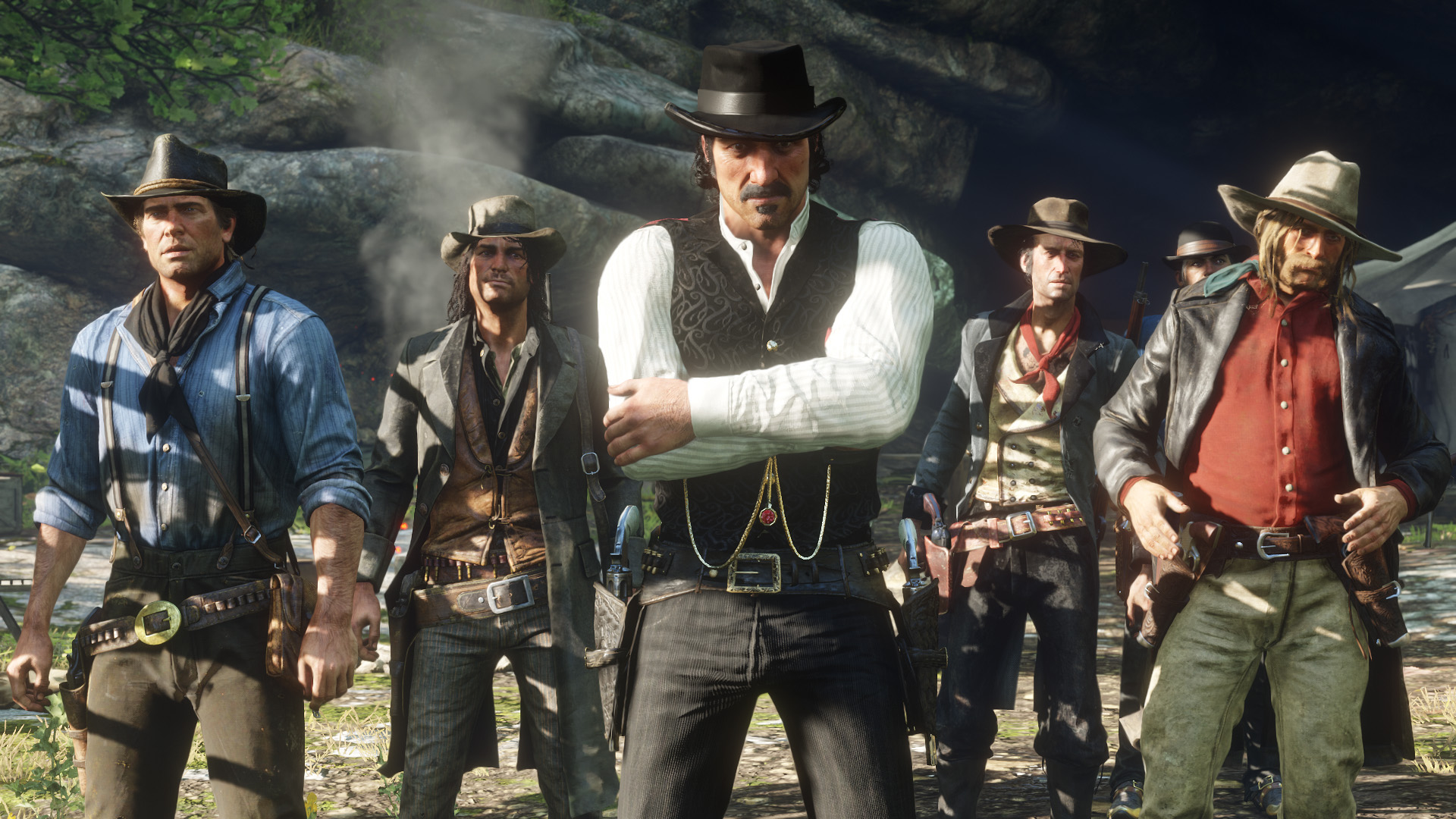
The Fiends We Met Along the Way
I always have a difficult time discussing the “story” of games as big as Red Dead Redemption 2, mainly because these kinds of games lend themselves better to scores of miniature stories better than one overarching narrative. It’s difficult to balance the two, yet despite its occasional story stumbles, RDR2 tells as compelling a tale as I’ve experienced this year, and it particularly succeeds in developing its main characters.
Without getting too deep into the main narrative, Red Dead Redemption 2’s basic plot goes like this: you play as Arthur Morgan, a cowboy who considers his gang of outlaws to be his one true family and the only group of people he trusts. The gang, which is run by the charming yet ruthless Dutch van der Linde, begins the game on the lam, having just escaped a catastrophic failure of a job in the city of Blackwater. Morgan, Dutch, and a diverse set of people head out East to escape the lawmen looking for them in the West, traveling through parts of the deep south and even Saint Denis, a facsimile of New Orleans.
The game shines brightest when it focuses on the deep, caring, and complex relationships Arthur has with fellow members of his gang. RDR2’s most dazzling firefights are often bookended with thoughtful discussions between Morgan and his fellow traveling companions, giving the player insight into each persons thoughts, motivations, opinions, hopes, and fears. The interactions at the camp itself are particularly outstanding, as the player can spend hours just chatting it up with friends, who often have memorable things to say about recent missions and events. Occasionally, the band will get together at night for a party, during which Arthur can engage in light banter with others, sing songs, or even just witness some truly incredible conversations other gang members have with one another. These interactions will occur regardless of whether or not the player is nearby, but when you get to see them for yourself, you truly begin to care for these people, even if they are a bunch of crazy outlaws.
Though this caravan of misfits and outcasts contains a wide array of interesting and sympathetic characters, none steal the show quite the same way Dutch van der Linde himself does. The game makes it immediately apparent to the player why anyone would be so loyal to a man whose entire life story is rooted in crime; Dutch has quite a way with words, charming just about everyone who doesn’t actually understand the nature of his past, and he clearly cares deeply about each and every member of his pack. For most of the game, he particularly adores Arthur and treats him as though he were his own child, even calling him “son” at times. Whenever a member of the gang is captured or killed, he rages against the offenders with the fury of a thousand suns. And even when things couldn’t look more dire for his compatriots, he maintains a tragically high level of optimism, constantly telling everyone that they are one big job away from retiring in paradise overseas.
In a sense, Red Dead Redemption 2 is more about Dutch than Arthur Morgan. Van der Linde represents more than a single person trying to be truly free in 1899 America. He is America. He’s sanctimonious, prone to angry and destructive behavior, and full of empty promises. Whenever he feels wronged, he retaliates with cold-blooded murder or arson. He’ll tell you he cares about your problems, but only helps insofar as it benefits him. He claims to care about the plight of Native Americans and African Americans, but responds to their stories by shaking his head, saying “damn shame,” and doing little to help (or actually making things worse). He honestly believes all of the havoc he wreaks and blood he sheds is for some greater good. Throughout the main story, various characters begin to doubt whether Dutch actually knows what he’s doing, but they quickly become charmed once again by his spirit and his iron will. Either that or they realize they don’t really have a better alternative.
The game’s world and how the characters interact with it (and everyone within) reflect this same sentiment, as every part of “the heartlands” and “civilization” displays America’s foibles, including mass industrialization, pollution, colonialism, over-policing, sexism, racism, and slavery. Each gorgeous landscape is swiftly followed by an image of a factory polluting the air, and a night walking through the forest may result in an encounter with the KKK. Despite how much Red Dead Redemption 2 wants the player to appreciate America’s natural beauty, it doesn’t waste much time with empty flattery of a history riddled with atrocities.
RDR2 attempts numerous times to touch on these subjects more deeply through quests or conversations, which is fundamentally something I appreciate, particularly considering how often game publishers say they wish to avoid sending political messages through their products. Still, Rockstar’s latest effort often fails to adequately wrestle with many of the tougher issues it brings up. For example, one quest has Arthur assisting two Native Americans in their attempt to steal a report on oil reserves. When the younger of the two (named Eagle Flies) expresses a desire to declare war on the white political elite of Lemoyne (a fictional state that closely resembles Louisiana) and shows very little faith that Mr. Morgan genuinely wants to help, Arthur replies that the government hates outlaws like him just as much as this nation’s indigenous people. This is an absurd interaction for (what should be) obvious reasons, and the fact that Arthur isn’t really challenged on this assertion suggests that Rockstar A) doesn’t understand history and/or B) believes Arthur is right.
Conversations like this occur frequently in the game, and while sometimes they result in a moderately productive exploration of injustice and the mendacity behind so-called American Exceptionalism, often they’re just window dressing, the video game equivalent of “thoughts and prayers.” You’ll see Tilly, a black woman in Dutch’s gang, telling Arthur how uncomfortable she is living in the deep south because her mother was a slave, though that anxiety pretty much ends there. You’ll encounter white southerners who yearn for the days when slavery was still legal, though the game hardly acknowledges the disasters of reconstruction and Jim Crow laws. Red Dead Redemption 2 certainly addresses these issues in a somewhat more delicate manner than previous Rockstar titles, but so many of these experiences come off as performative, or rather Rockstar’s way of saying “we’re on your side” or “we get it” without going any further.
The overall narrative isn’t fully hindered by these failures, as the strength of the game’s characters (particularly Dutch) make for some truly memorable sequences. That said, game makers need to do a better job of really exploring some of these difficult topics if they want to address them at all. Simply saying “racism is bad” a whole bunch of times isn’t enough.
(By the way, this is an issue that a lot of game makers have, and it’s probably due to the lack of diversity in the creative process.)
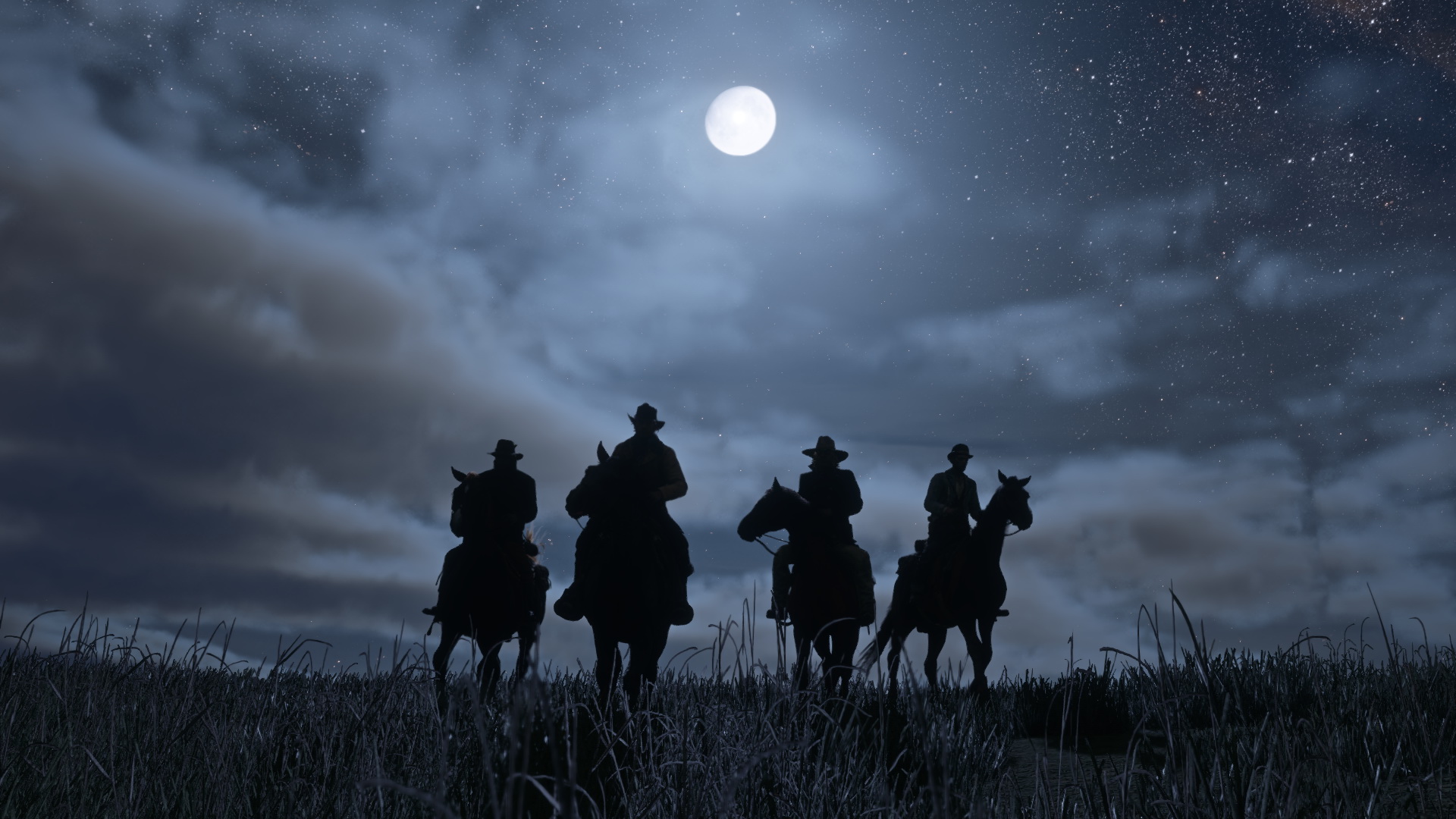
The Sun Sets in the West
For some silly reason, I still hear gamers occasionally lamenting that we have yet to find the Citizen Kane of video games. Obviously, there are many problems with this line of thinking, but this desire to find the ultimate gaming masterpiece often leads us to accepting the next big thing as that very achievement without being sufficiently critical of its shortcomings. We did this with BioShock. We did this with Skyrim. We did this with The Witcher 3: Wild Hunt. We did this with The Legend of Zelda: Breath of the Wild. We will probably do this next year with Anthem or Cyberpunk 2077. Many critics are already doing this with Red Dead Redemption 2.
There will never be a Citizen Kane of gaming. Gamers are not a monolith, and the idea of everyone unanimously agreeing on something these days is laughable (not that everyone thinks Citizen Kane is the greatest film ever, either). Something can be great without bearing the weight of being one of the greats.
As stellar as it is, Red Dead Redemption 2 is certainly not the game to end all games, no matter how hard it tries to be. It is one of the best games of the year and worthy of great praise for all it does well, but its failures highlight one of the greatest frustrations I have with video games as a medium: a strange devotion to excess. There are too many systems, too many quests, too many unexplored themes and stories, and too many instances where I feel like the game becomes a different game.
I hope other developers see what Red Dead Redemption 2 does best and try to emulate those qualities in their games. I hope they realize that they can do something as great as RDR2 without making the main story 50 hours long. I hope such games can appropriately address topics such as racism and colonialism with the level of detail and respect they deserve. I hope all of this can be done without mistreating the people actually making the game. I don’t think any of that is too much to ask.
Sam has been playing video games since his earliest years and has been writing about them since 2016. He’s a big fan of Nintendo games and complaining about The Last of Us Part II. You either agree wholeheartedly with his opinions or despise them. There is no in between.
A lifelong New Yorker, Sam views gaming as far more than a silly little pastime, and hopes though critical analysis and in-depth reviews to better understand the medium's artistic merit.
Twitter: @sam_martinelli.


